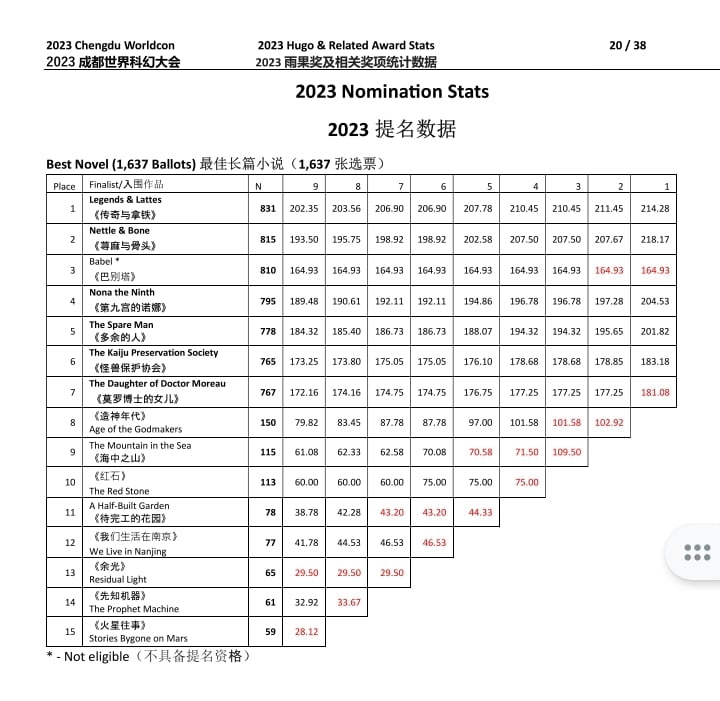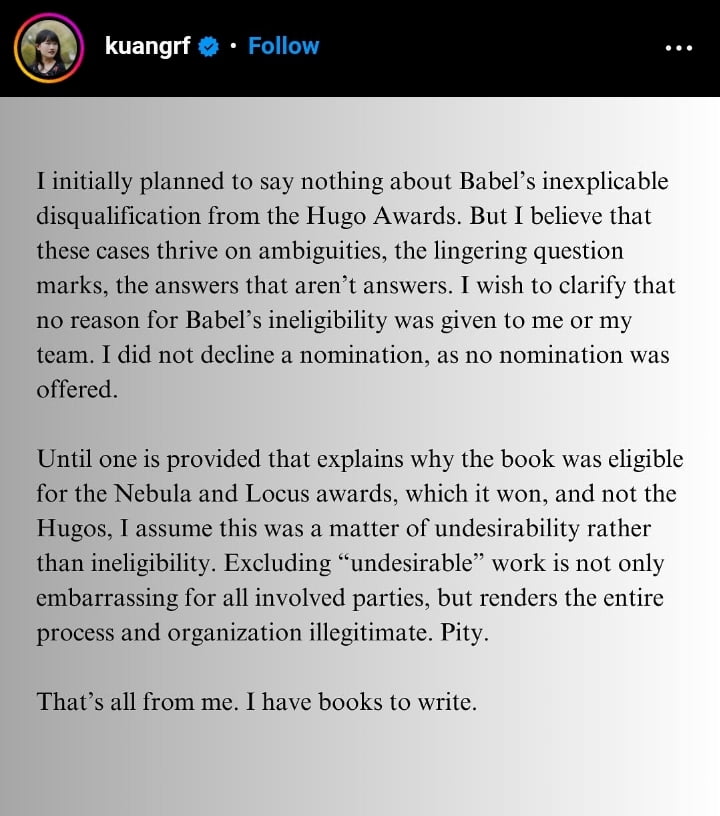The Hugo Awards, a prestigious annual event celebrating achievements in science fiction and fantasy, is embroiled in controversy yet again. This time, the exclusion of R.F. Kuang’s “Babel” from the 2023 nominations, despite its critical acclaim and Nebula Award win, has raised questions and concerns among fans and authors.
Eligibility controversy: the exclusion of ‘Babel’ and others from Hugo nominations
The Hugo Awards have faced various controversies in the past, including questionable sponsorships and issues around diversity and misgendering of finalists. The latest issue emerged after the release of new nomination data from the 2023 event, held by Chengdu Worldcon in China. The data revealed that certain authors and books, despite receiving enough votes, were deemed “not eligible” for inclusion.

A notable case is author Xiran Jay Zhao, known for “Iron Widow” and “Zachary Ying and the Dragon Emperor,” who found themselves ineligible for the Astounding Award for Best New Writer. Similarly, R.F. Kuang’s “Babel: Or the Necessity of Violence: An Arcane History of the Oxford Translators’ Revolution” was excluded from the Best Novel category. Zhao expressed their surprise and confusion over Twitter, highlighting the lack of clarity behind these decisions.
They said: “wait wait wait I just found out RF Kuang and I were deliberately excluded from the Hugo Awards in Chengdu last year for unspecified reasons despite having the votes to be finalists in our categories??”
“Babel” has been particularly noted for its exclusion given its high praise in literary circles, winning the Nebula Award in 2022 for Best Novel and featuring as Blackwell’s Books of the Year for Fiction for 2022. The book was also an instant New York Times best-seller.
Behind the scenes: understanding the Hugo Awards administration and decision-making
The Hugo Awards website clarified that they do not administer the Awards, and each year’s event is independently run by that year’s World Science Fiction Convention. Inquiries about the 2023 Hugo Awards have been forwarded to the current year’s Hugo Award Administrators.
On its website, it states: “The Hugo Awards website does not administer the Awards. Each year’s Awards are administered by the that year’s World Science Fiction Convention, which is solely responsible for the conduct of that year’s Awards. If you send questions regarding the 2023 Hugo Awards to us, we can only forward them to the current year’s Hugo Award Administrators.”
Read: Rebecca Kuang on fantasy: from Babel, Yellowface to hell
In a public discussion, Paul Weimer, also marked as “not eligible” in the Best Fan Writer category, sought clarity on the eligibility criteria. Kevin Standlee, a member of the Hugo Awards Marketing Committee, responded, explaining that each Worldcon makes its own decisions and operates independently under the World Science Fiction Society rules.
In response to a Gizmodo query, Standlee reiterated the independence of the Worldcon organisations and directed inquiries to his personal blog for more context and background information on the 2023 Worldcon and the Hugo Awards.
Read: Mongolian books face ban as part of China’s ‘cultural genocide’
R.F. Kuang broke her silence on the issue in an Instagram post. She stated that no reason for “Babel’s” ineligibility was given and emphasised the lack of transparency and clarity in the decision-making process. Kuang expressed her disappointment, suggesting that the exclusion might be due to the book being “undesirable” rather than ineligible, calling into question the legitimacy of the entire process.

As the literary community seeks answers, the situation remains unclear. How To Be Books promises to provide updates as more information becomes available regarding the eligibility controversy surrounding the Hugo Awards.
[…] Read: Hugo Awards controversy: R. F. Kuang’s Babel excluded […]
[…] Fiction Society’s service marks, have resigned from their positions following allegations of censorship in the 2023 Hugo Awards nomination […]
[…] Read: Hugo Awards controversy: R. F. Kuang’s Babel excluded […]
[…] Read: Hugo Awards controversy: R. F. Kuang’s Babel excluded […]